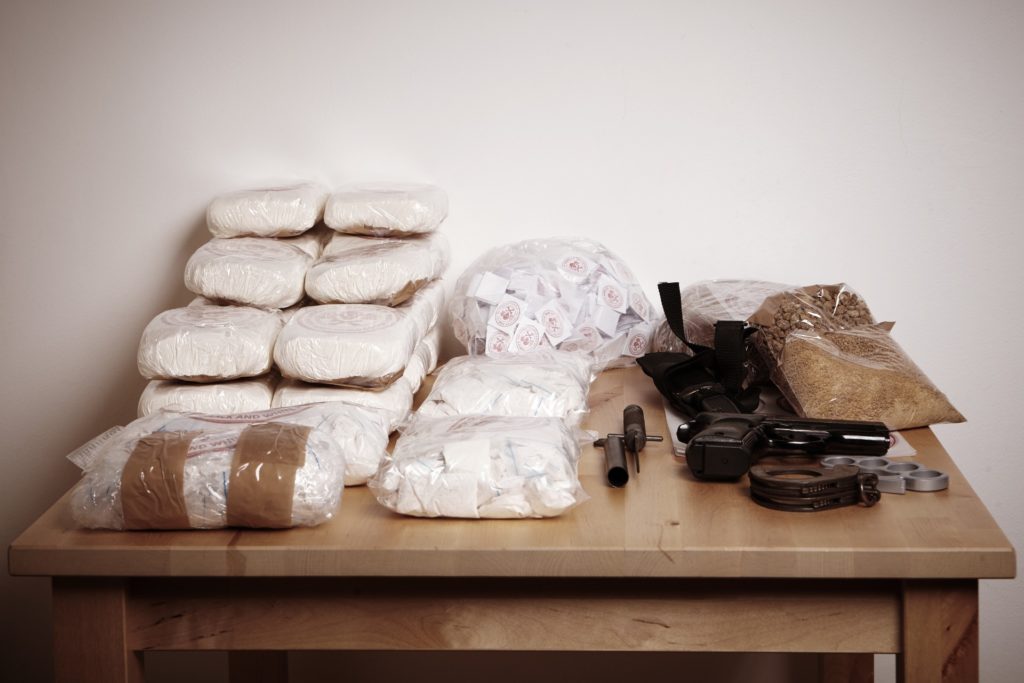

Drug charges encompass a wide variety of offenses. Many people think of drug crimes as being primarily related to possession of a controlled substance. However, there are a variety of drug-related crimes that have specific parameters and penalties. Depending on the type of drug charge you are facing, you might face varying consequences––including fines, jail time, and community service––upon a conviction.
Drug dealing and drug trafficking are two different crimes; however, these terms are often used interchangeably. They describe different degrees of drug distribution charges. In general, distribution crimes involve any offense where the sale of narcotics occurred. Drug dealing is a colloquial term that generally refers to smaller-scale drug distribution charges, while drug trafficking tends to involve larger-scale drug distribution crimes. If you are facing drug distribution charges of any scale, it’s essential to secure the help of a skilled Louisiana drug defense attorney. Here is some important information to know the difference between drug dealing and trafficking.
What’s the Difference Between Drug Dealing and Drug Trafficking?
As mentioned above, drug dealing and trafficking fall under the larger umbrella of drug distribution, with “dealing” referring to smaller offenses and “trafficking” referring to more involved operations. Drug dealing and trafficking fall under the larger umbrella of drug distribution, which is a serious drug crime. If you are found selling drugs at the street level but law enforcement doesn’t suspect you are at the top of a distribution scheme, it’s more likely you will face less severe charges.
Conversely, if you are found with large amounts of various drugs, such as crack cocaine, or if the police suspect you are involved with urban street gangs, you will likely face trafficking charges. However, there are a variety of factors that could affect the type of distribution charge you will face. For example, when certain kinds of drugs—such as heroin—are found in small amounts, it’s likely the prosecutor will pursue more severe charges.
Both drug dealing and trafficking are considered serious drug offenses with severe legal consequences.
Understanding Drug Crimes and Charges
Drug crimes and charges can be complex and nuanced, with varying degrees of severity and penalties. In Louisiana, drug trafficking and distribution charges are considered serious offenses, carrying harsh penalties and potential life-changing consequences. Understanding the differences between drug trafficking and distribution charges is crucial for individuals facing these charges.
Drug trafficking charges typically involve the transportation or sale of large quantities of illegal drugs, often across state or national borders. In contrast, drug distribution charges involve the sale or delivery of smaller quantities of drugs, often within a specific geographic area. Both charges can result in felony convictions, with penalties ranging from mandatory minimum sentences to life imprisonment.
Drug Distribution Offenses and Penalties in Louisiana
Any offenses that involve the manufacturing and distribution of controlled substances are classified as a drug distribution charge. This also includes the transportation and selling of prescription drugs, such as pain killers, anxiety medications, and sleeping pills. In Louisiana, drug crimes and charges are some of the most harshly pursued offenses. While drug charges can be classified as a felony or misdemeanor, depending on the case, most drug trafficking charges will be tried as felonies.
A drug trafficking conviction can lead to severe penalties, including lengthy prison sentences and significant fines. The penalties you may face from a drug distribution conviction will depend on the number of drugs you had in your possession along with their Schedules under Louisiana law. Additionally, the following factors can influence the penalties of a conviction:
- A history of drug convictions
- Being armed while you were caught distributing drugs
- Selling drugs to minors or near the perimeter of a school
Many illegal drugs originate overseas and are trafficked into Louisiana, contributing to the complexity of drug distribution networks.
The best way to fight drug charges in Louisiana is to secure the help of a skilled criminal defense attorney. Organized crime groups often play a significant role in drug trafficking, exploiting vulnerable individuals and engaging in corruption to facilitate their operations.
Building a Strong Criminal Defense
If you are facing drug distribution charges, it is essential to build a strong criminal defense. This can involve:
- Working with an experienced attorney who has knowledge of drug laws and regulations
- Gathering evidence and witness statements to support your case
- Challenging the prosecution’s evidence and arguments
- Negotiating plea deals or reduced sentences
- Presenting a compelling defense strategy to the court
A skilled attorney can help you navigate the complexities of drug charges and build a strong defense to protect your rights and freedom.
Contact a Louisiana Drug Defense Lawyer
In Louisiana, drug convictions can have a significant, long-lasting impact on your life. Drug convictions can affect a person’s ability to gain employment, housing, and qualify for loans. If you are facing drug charges in Louisiana, it’s essential to work with a skilled drug defense lawyer. An experienced attorney can develop a successful defense strategy based on the factors surrounding your case.
At the John D. & Eric G. Johnson Law Firm, we have the expertise and experience to best represent your case in court. Attorney Eric Johnson knows how to devise a winning defense strategy. With over 25 years of experience, he is a problem solver who is committed to thoroughly investigating your case. To schedule a free consultation, call (318) 377-1555 or complete our online contact form.
